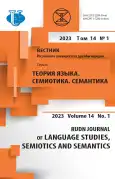Linking Word Use and Personality Characteristics: A Contrastive Study into Parliamentary Communications of Labour Leaders Jeremy Corbyn and Keir Starmer
- Авторлар: Mukhortov D.S.1, Zhovner E.A.1
-
Мекемелер:
- Moscow State Institute of International Relations (University)
- Шығарылым: Том 14, № 1 (2023)
- Беттер: 53-69
- Бөлім: DISCURSIVE STUDIES
- URL: https://journal-vniispk.ru/2313-2299/article/view/323449
- DOI: https://doi.org/10.22363/2313-2299-2023-14-1-53-69
- EDN: https://elibrary.ru/QGMMWR
- ID: 323449
Дәйексөз келтіру
Толық мәтін
Аннотация
Over the past thirty years, Russian linguistic studies have noted terminological heterogeneity in the concepts of “jazykovaja lichnost” and “kommunikativnaja lichnost”, literally “linguistic personality” and “communicative personality”, however, in the field of political communication, due to the inextricable connection of political discourse with the socio-cultural, historical, or political context that constructs it, their differentiation was observed rather than interchangeability. This research seeks to characterise “kommunikativnaja lichnost”, a key concept in linguopersonology. The evidence base is parliamentary speeches of Jeremy Corbyn and Keir Starmer, previous and current leaders of the Labor Party of Great Britain. The results of a qualitative analysis have been verified through the Sketch Engine content analysis program, and they demonstrate how a politician’s rhetoric can change depending on situational factors - in this case, the foreign political situation and domestic political processes. The overarching theme of the politicians’ communications is the termination of the UK’s membership in the European Union and the protracted coronavirus pandemic, which is the root of all social and economic ills. The words frequently used by Corbyn and Starmer are predetermined by the communicative behaviours of the politicians. The article attempts to determine the ‘communicative personality’ of Corbin and Starman using the leadership typology proposed by Harold Lasswell. This work thus contributes to the development of linguopersonology provisions and raises the necessity to develop types of the ‘communicative personality’ of a politician. Given the analysis results, the article suggests interpreting the Russian concept ‘kommunikativnaja lichnost’ as ‘linking word use and personality characteristics’.
Авторлар туралы
Denis Mukhortov
Moscow State Institute of International Relations (University)
Хат алмасуға жауапты Автор.
Email: dennismoukhortov@mail.ru
ORCID iD: 0000-0002-8174-7055
PhD, Associate Professor of the English Department № 1, International Relations School
76, Vernadsky Prospekt, Moscow, Russia Federation, 119454Elizaveta Zhovner
Moscow State Institute of International Relations (University)
Email: e.zhovner@my.mgimo.ru
ORCID iD: 0000-0002-0656-5307
PhD Candidate at the English Department № 1, International Relations School
76, Vernadsky Prospekt, Moscow, Russia Federation, 119454Әдебиет тізімі
- Ariskina, O.L. & Dryangina, E.A. (2011). Linguistic and Communicative Personality: Different Approaches to Research. Bulletin of the Chelyabinsk State University, 25 (240), 15–18. (In Russ.).
- Sakharova, A.V. (2017). Formation of the Language Personality: Social-Philosophical Aspect [dissertation]. Ivanovo. (In Russ.).
- Karaulov, Y.N. (2010). The Russian Language and Language Personality. Moscow: LKI publ. (In Russ.).
- Prokhorov, Y.E. (2017). National Socio-Cultural Stereotypes of Speech Communication and their Role in Teaching Russian to Foreigners. Moscow: URSS publ. (In Russ.).
- Leontiev, A.A. (2019). Language. Speech. Speech Activity. Moscow: URSS publ. (In Russ.).
- Krasnykh, V.V. (2003). Insiders among Outsiders: Myth or Reality? Moscow: Gnozis publ. (In Russ.).
- Karasik, V.I. (2002). Linguistic Circle: Personality, Concepts, Discourse. Volgograd: Peremena publ. (In Russ.).
- Konetskaya, V.P. (1997). Communication Sociology. Moscow. (In Russ.).
- Karasik, V.I. & Slyshkin, G.G. (2021). Modern Discourse Developmental Trends. Current Issues in Philology and Pedagogical Linguistics, 1, 14–31. (In Russ.).
- Mukhortov, D.S. (2014). ‘Yazykovaya Lichnost’, ‘Rechevoy Portret’, ‘Idiostil’, ‘Idiolect’: The Notions of Russian Scholars in Contrast. What is Required to Study the Stylistic Behaviour of the Politician? In: Political communication: prospects for the development of the scientific direction: materials of the Intern. scientific conf. (Yekaterinburg, August 26–28, 2014). Yekaterinburg. pp. 167–172. (In Russ.).
- Wodak, R. (1996). Disorders of discourse. London; N.Y.: Longman.
- Tsytsarkina, N.N. (2015). Actualization of the Frames «Social Relations» in Political Discourse of American and British Mass Media. In: Politics and Politicians: Political Disourse as an Object of Linguistic Analysis (Proceedings of the VIII RISA Convention, April 2014). Moscow: MGIMO-University. (In Russ.).
- Sheigal, E.I. (2004). Semiotics of political discourse. Moscow: Gnozis publ. (In Russ.).
- Bozhenkova, N.A., Bozhenkova, R.K. & Bozhenkova, A.M. (2017). Modern political discourse: verbal exemplification of tactical and strategic preferences. RUDN Journal of Russian and Foreign Languages Research and Teaching, 15 (3), 255–284. https://doi.org/10.22363/23132264-2017-15-3-255-284 (In Russ.).
- Mukhortov, D. & Zhovner E. (2019). The Bull and Bear Communicative Strategies in the US presidential campaign rhetoric. Rhema, 2, 48–60. https://doi.org/10.31862/25002953-2019-2-48-60 (In Russ.).
- Tsutsieva, M.G. (2019). Actualization of the linguistic personality of a politician in modern German political discourse [dissertation]. Saint-Petersburg. (In Russ.).
- Tausczik, Y.R. & Pennebaker, J.W. (2010). The Psychological Meaning of Words: LIWC and Computerized Text Analysis Methods. Journal of Language and Social Psychology, 29(1), 24–54. https://doi.org/10.1177/0261927x09351676
- Lasswell, H.D. (2005). Psychopathology and Politics. Moscow: RAGS publ. (In Russ.).
Қосымша файлдар









